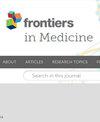The lifestyle and nutritional factors for dry eye disease in depression population: a retrospective case–control study
IF 3.1
3区 医学
Q1 MEDICINE, GENERAL & INTERNAL
引用次数: 0
Abstract
BackgroundWe aim to evaluate lifestyle and nutritional factors that lead to dry eye disease (DED) in a depressed population using data from the Taiwan BioBank (TWB).MethodsA retrospective case–control study was conducted, and patients with depression based on a questionnaire were selected as the depression group. Each patient in the depression group was matched by age and sex to two individuals without depression, and a total of 3,754 and 7,508 patients constituted the depression and non-depression groups, respectively. Based on the questionnaire, the primary outcome was the presence of DED. Additionally, the chi-square test and interaction test were applied to survey the effect of lifestyle and nutritional factors on DED in the depression and non-depression groups.ResultsThere were 822 (21.90%) and 958 (12.76%) DED patients in the depression and non-depression groups, respectively, and the incidence of DED was significantly higher in the depression group (抑郁症人群干眼症的生活方式和营养因素:一项回顾性病例对照研究
背景我们旨在利用台湾生物库(TWB)的数据,评估导致抑郁症人群患干眼症(DED)的生活方式和营养因素。方法我们开展了一项回顾性病例对照研究,根据调查问卷选择抑郁症患者作为抑郁症组。抑郁症组中的每名患者均与两名非抑郁症患者按年龄和性别进行配对,抑郁症组和非抑郁症组分别共有 3 754 名和 7 508 名患者。根据调查问卷,主要结果是是否存在 DED。结果抑郁组和非抑郁组分别有 822 名(21.90%)和 958 名(12.76%)DED 患者,抑郁组的 DED 发生率显著高于非抑郁组(p &p;lt;0.001)。在抑郁症人群的生活方式和营养因素方面,与无DED的抑郁症患者相比,抑郁症人群中慢性疼痛和久坐不动的比例更高(均为p &;lt;0.05)。根据交互检验,慢性疼痛(p = 0.0227)和久坐不动的生活方式(p = 0.0002)是抑郁症组比非抑郁症组出现 DED 的显著风险因素,而持续饮用咖啡(p = 0.0005)和饮茶(p = 0.0003)则是抑郁症组而非抑郁症组出现 DED 的显著保护因素。
本文章由计算机程序翻译,如有差异,请以英文原文为准。
求助全文
约1分钟内获得全文
求助全文
来源期刊

Frontiers in Medicine
Medicine-General Medicine
CiteScore
5.10
自引率
5.10%
发文量
3710
审稿时长
12 weeks
期刊介绍:
Frontiers in Medicine publishes rigorously peer-reviewed research linking basic research to clinical practice and patient care, as well as translating scientific advances into new therapies and diagnostic tools. Led by an outstanding Editorial Board of international experts, this multidisciplinary open-access journal is at the forefront of disseminating and communicating scientific knowledge and impactful discoveries to researchers, academics, clinicians and the public worldwide.
In addition to papers that provide a link between basic research and clinical practice, a particular emphasis is given to studies that are directly relevant to patient care. In this spirit, the journal publishes the latest research results and medical knowledge that facilitate the translation of scientific advances into new therapies or diagnostic tools. The full listing of the Specialty Sections represented by Frontiers in Medicine is as listed below. As well as the established medical disciplines, Frontiers in Medicine is launching new sections that together will facilitate
- the use of patient-reported outcomes under real world conditions
- the exploitation of big data and the use of novel information and communication tools in the assessment of new medicines
- the scientific bases for guidelines and decisions from regulatory authorities
- access to medicinal products and medical devices worldwide
- addressing the grand health challenges around the world
 求助内容:
求助内容: 应助结果提醒方式:
应助结果提醒方式:


